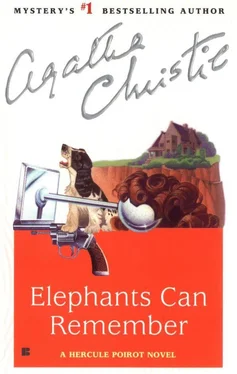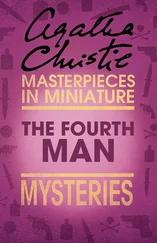Agatha Christie - Elephants Can Remember
Здесь есть возможность читать онлайн «Agatha Christie - Elephants Can Remember» весь текст электронной книги совершенно бесплатно (целиком полную версию без сокращений). В некоторых случаях можно слушать аудио, скачать через торрент в формате fb2 и присутствует краткое содержание. Год выпуска: 2004, ISBN: 2004, Издательство: Berkley, Жанр: Классический детектив, на английском языке. Описание произведения, (предисловие) а так же отзывы посетителей доступны на портале библиотеки ЛибКат.
- Название:Elephants Can Remember
- Автор:
- Издательство:Berkley
- Жанр:
- Год:2004
- ISBN:ISBN-13: 978-0425067826
- Рейтинг книги:3 / 5. Голосов: 1
-
Избранное:Добавить в избранное
- Отзывы:
-
Ваша оценка:
- 60
- 1
- 2
- 3
- 4
- 5
Elephants Can Remember: краткое содержание, описание и аннотация
Предлагаем к чтению аннотацию, описание, краткое содержание или предисловие (зависит от того, что написал сам автор книги «Elephants Can Remember»). Если вы не нашли необходимую информацию о книге — напишите в комментариях, мы постараемся отыскать её.
Elephants Can Remember — читать онлайн бесплатно полную книгу (весь текст) целиком
Ниже представлен текст книги, разбитый по страницам. Система сохранения места последней прочитанной страницы, позволяет с удобством читать онлайн бесплатно книгу «Elephants Can Remember», без необходимости каждый раз заново искать на чём Вы остановились. Поставьте закладку, и сможете в любой момент перейти на страницу, на которой закончили чтение.
Интервал:
Закладка:
"Yes. Everyone comes up against that sooner or later," said Mrs. Oliver. "But you see now what upset me at this particular party. It seems an extraordinary thing to be asked to do by a complete stranger like Mrs. Burton-Cox. I couldn't imagine why she should want to know. It was no business of hers, surely. Unless-"
"You thought it was, unless it was something to do with my marrying Desmond. Desmond is her son,"
"Yes, I suppose it could have been, but I couldn't see how, or what business it was of hers."
"Everything's her business. She's nosey-in fact she's what you said she was, an odious woman."
"But I gather Desmond isn't odious."
"No. No, I'm very fond of Desmond and Desmond is fond of me. I don't like his mother."
"Does he like his mother?"
"I don't really know," said Celia. "I suppose he might like her-anything's possible, isn't it? Anyway, I don't want to get married at present. I don't feel like it. And there are a lot of-oh, well, difficulties, you know there are a lot of fors and againsts. It must have made you feel rather curious," said Celia. "I mean, why Mrs. Nosey Cox should have asked you to try and worm things out of me and then run along and spill it all to her- Are you asking me that particular question, by the way?"
"You mean, am I asking you whether you think or know that your mother killed your father or your father killed your mother, or whether it was a double suicide? Is that what you mean?"
"Well, I suppose it is, in a way. But I think I have to ask you also, if you were wanting to ask me that, whether you were doing so with the idea of giving Mrs. Burton-Cox the information you obtained, in case you did receive any information from me."
"No," said Mrs. Oliver. "Quite decidedly no. I shouldn't dream of telling the odious woman anything of the sort. I shall tell her quite firmly that it is not any business of hers or of mine, and that I have no intention of obtaining information from you and retailing it to her."
"Well, that's what I thought," said Celia. "I thought I could trust you to that extent. I don't mind telling you what I do know. Such as it is."
"You needn't. I'm not asking you for it."
"No. I can quite see that. But I'll give you the answer all the same. The answer is-nothing."
"Nothing," said Mrs. Oliver thoughtfully.
"No. I wasn't there at the time. I mean, I wasn't in the house at the time. I can't remember now quite where I was. I think I was at school in Switzerland, or else I was staying with a school friend during the school holidays. You see, it's all rather mixed up in my mind by now."
"I suppose," said Mrs. Oliver doubtfully, "it wouldn't be likely that you would know. Considering your age at the time."
"I'd be interested," said Celia, "to know just what you feel about that. Do you think it would be likely for me to know all about it? Or not to know?"
"Well, you said you weren't in the house. If you'd been in the house at the time then, yes, I think it would be quite likely that you might know something. Children do. Teen-agers do. People of that age know a lot, they see a lot, they don't talk about it very often. But they do know things that the outside world wouldn't know, and they do know things that they wouldn't be willing, shall we say, to tell to police inquirers."
"No. You're being quite sensible. I wouldn't've known. I don't think I did know. I don't think I had any idea. What did the police think? You don't mind my asking you that, I hope, because I should be interested. You see, I never read any account of the inquest or anything like that or the inquiry into it."
"I think they thought it was a double suicide, but I don't think they ever had any inkling as to the reason for it."
"Do you want to know what I think?"
"Not if you don't want me to know," said Mrs. Oliver.
"But I expect you are interested. After all, you write crime stories about people who kill themselves or kill each other, or who have reasons for things. I should think you would be interested."
"Yes, I'll admit that," said Mrs. Oliver. "But the last thing I want to do is to offend you by seeking for information which is no business of mine to know."
"Well, I wondered," said Celia. "I've often wondered from time to time why, and how, but I knew very little about things. I mean, about how things were going on at home. The holidays before that I had been away on exchange on the continent, so I hadn't seen my mother and father really very recently. I mean, they'd come out to Switzerland and taken me out from school once or twice, but that was all. They seemed much as usual, but they seemed older. My father, I think, was ailing. I mean, getting feebler. I don't know if it was heart or what it was. One doesn't really think about that.
My mother, too, she was going rather nervy. Not hypochondriac, but a little inclined to fuss over her health. They were on good terms, quite friendly. There wasn't anything that I noticed. Only sometimes one would, well, sometimes one gets ideas. One doesn't think they're true or necessarily right at all, but one just wonders if-"
"I don't think we'd better talk about it any more," said Mrs. Oliver. "We don't need to know or find out. The whole thing's over and done with. The verdict was quite satisfactory.
No means to show, or motive, or anything like that. But there was no question of your father having deliberately killed your mother or of your mother having deliberately killed your father."
"If I thought which was most likely," said Celia, "I would think my father killed my mother. Because, you see, it's more natural for a man to shoot anyone, I think. To shoot a woman for whatever reason it was. I don't think a woman, or a woman like my mother, would be so likely to shoot my father.
If she wanted him dead, I should think she might have chosen some other method. But I don't think either of them wanted the other one dead."
"So it could have been an outsider."
"Yes, but what does one mean by an outsider?" said Celia.
"Who else was there living in the house?"
"A housekeeper, elderly, rather blind and rather deaf, a foreign girl, an au pair girl, she'd been my governess once- she was awfully nice-she came back to look after my mother, who had been in hospital- And there was an aunt whom I never loved much. I don't think any of them could have been likely to have any grudge against my parents. There was nobody who profited by their deaths, except, I suppose, myself and my brother Edward, who was four years younger than I was. We inherited what money there was, but it wasn't very much. My father had his pension, of course. My mother had a small income of her own. No. There was nothing there of any importance."
"I'm sorry," said Mrs. Oliver. "I'm sorry if I've distressed you by asking all this."
"You haven't distressed me. You've brought it up in my mind a little and it has interested me. Because, you see, I am of an age now that I wish I did know. I knew and was fond of them, as one is fond of parents. Not passionately, just normally, but I realize I don't know what they were really like. What their life was like. What mattered to them. I don't know anything about it all. I wish I did know. It's like a burr, something sticking into you, and you can't leave it alone. Yes.
I would like to know. Because then, you see, I shouldn't have to think about it any more."
"So you do? Think about it?" Celia looked at her for a moment. She seemed to be trying to come to a decision.
"Yes," she said, "I think about it nearly all the time. I'm getting to have a thing about it, if you know what I mean. And Desmond feels the same."
Chapter V. Old Sins Have Long Shadows
Helercule Poirot let the revolving door wind him round.
Arresting the swing of it with one hand, he stepped forward into the small restaurant. There were not many people there.
Читать дальшеИнтервал:
Закладка:
Похожие книги на «Elephants Can Remember»
Представляем Вашему вниманию похожие книги на «Elephants Can Remember» списком для выбора. Мы отобрали схожую по названию и смыслу литературу в надежде предоставить читателям больше вариантов отыскать новые, интересные, ещё непрочитанные произведения.
Обсуждение, отзывы о книге «Elephants Can Remember» и просто собственные мнения читателей. Оставьте ваши комментарии, напишите, что Вы думаете о произведении, его смысле или главных героях. Укажите что конкретно понравилось, а что нет, и почему Вы так считаете.












